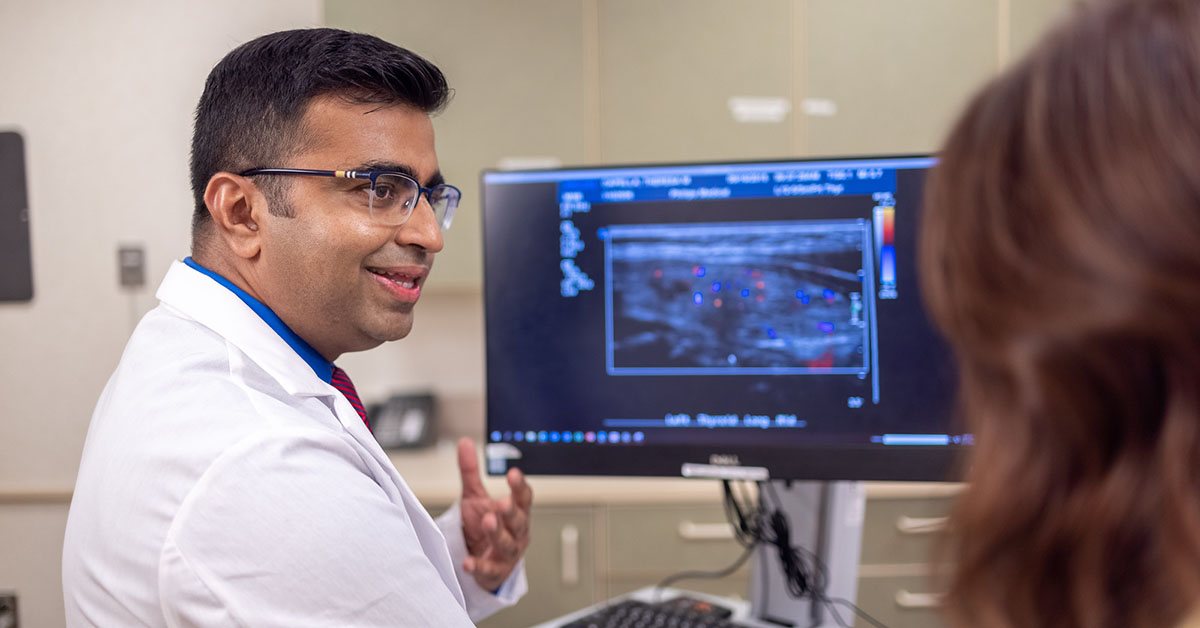
When Treating Thyroid Cancer, Less May Be More
-
Not long ago, a thyroid cancer diagnosis all but guaranteed a patient would have their entire thyroid removed. But newer guidelines have called for a less radical, more personalized standard of care.
“There has been a big shift in the pendulum in the way we manage thyroid cancer, especially since 2015,” said Pankaj Sharda, MD, FACP, FACE, ECNU, an endocrinologist at Fox Chase Cancer Center.
While thyroid removal, or a total thyroidectomy, is still the primary treatment for some thyroid cancers, that’s no longer the case for every patient.
Now there’s agreement that patients with low-risk thyroid cancers (up to 4 cm. thyroid tumors) may only need to have half of their thyroid gland removed, known as a partial thyroidectomy or hemithyroidectomy. Some patients with very small nodules or so-called micro cancers (less than 1 cm.), might even be candidates for active surveillance or watchful waiting.
This shift in treatment is reflective of how experts see thyroid cancer treatment in 2021: Not every patient is the same, and sometimes less treatment is more. “The de-escalation of treatment means an individualized approach to treatment, which means not everybody needs the whole thyroid out, and not everybody needs radioactive iodine,” Sharda said. Radioactive iodine is a common follow-up treatment after surgery for thyroid cancer.
Treatment is complex
The thyroid is a butterfly-shaped endocrine gland in the neck that makes thyroid hormones. These hormones play a key role in managing essential functions like helping the body use energy, regulate metabolism, and maintain the right temperature.
Patients who have their entire thyroid gland removed have to take synthetic thyroid hormone medications for the rest of their lives. And though thyroid surgery is generally considered safe, there are still risks. Surgery could damage a patient’s nerve supplying the vocal cords or parathyroid glands and lead to long-term side effects. There’s also the potential for severe bleeding in the immediate hours after the procedure.
Surgery to remove just part of the thyroid poses fewer risks. The majority of patients who retain half of their thyroid also don’t need to take thyroid medications or may need only low dose thyroid medication for thyroid cancer treatment. And many of those who do need medication may eventually be able to stop taking the drugs as the remaining part of their thyroid gland eventually regains function.
The decision to remove all or half of a patient’s thyroid is highly individualized. The size and location of the cancer (including the presence of other thyroid nodules in the contralateral lobe) and the risk for recurrence are the most important factors, but a patient’s age and personal preferences can also come into play.
It’s important to discuss all of these considerations with your surgeon and a multidisciplinary care team with experience treating thyroid cancers.
“Surgeons are not just technicians,” said Jeffrey Liu, MD, FACS, a surgical oncologist at Fox Chase Cancer Center. “You want them to be good at removing the thyroid and understanding the nuances of this cancer. Every once in a while when we do this surgery we find something unexpected, and you want someone who has a lot of experience and works as part of a multidisciplinary team, so they can make adjustments as necessary.”
“Survival of most thyroid cancers is in excess of 90%,” Liu said. Weighing the risks and benefits of different treatment approaches isn’t always easy, of course. But consulting with a panel of dedicated thyroid cancer specialists gives you the chance to explore your options fully—and feel confident that your treatment path will likely be successful.
At Fox Chase Cancer Center, we look forward to providing an individualized and evidence-based approach in thyroid cancer care.
Learn more about thyroid cancer treatment at Fox Chase.
